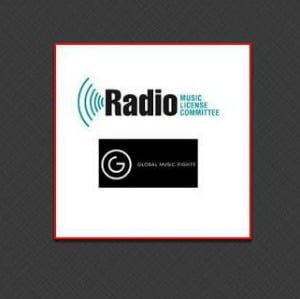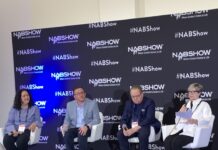
As the Radio Music Licensing Committee prepares for a 2020 trial against Irving Azoff’s Global Music Rights organization, the RMLC was hit with some bad news yesterday. The U.S. Department of Justice weighed in on the issue, siding with GMR. The DOJ’s anti-trust division said the RMLC’s argument to dismiss the GMR lawsuit was wrong. DOJ has no stake in the lawsuit, however, both sides did meet with the government earlier this year.
The Government agency says “RMLC wrongly argues that GMR’s complaint does not plead price fixing.” GMR lead counsel Dan Petrocelli said, “The court filing by the Department of Justice reaffirms the legal position of GMR and vindicates the rights of artists and songwriters to be free from illegal price-fixing by radio stations.”
Azoff’s GMR is similar to BMI and ASCAP, which radio already pays, and includes artists such as Drake, Bruce Springsteen, Bruno Mars, the Eagles, and Smokey Robinson. Radio stations have been operating directly with GMR in short-term side deals while the lawsuit works its way to trial. RMLC Executive Director Bill Velez told Radio Ink this week that the two sides were going through the discovery process in the run up to a trial targeted for very late next year.
Earlier this week radio stations were sent letters by GMR stating that their deals might be used as evidence in the lawsuit between RMLC and GMR, drawing individual stations into this fight for the first time.
GMR calls the RMLC “a 78-year-old cartel that dominates the $22 billion terrestrial radio industry.” Where GMR gets that $22 billion figure is a complete mystery. Radio is about a $13-$14 billion industry.
Whatever that number is, GMR says members of the RMLC illegally collude with one another to suppress rates paid to songwriters and composers for the public performance of their work.
Azoff said Thursday was a great day for artists who have been bullied by the RMLC since the dawn of the modern radio industry. “Advocating on behalf of artists is our founding principle, and we refused to allow this unfair status quo to continue. We believe the days of this brazen, long-running cartel are now numbered. GMR has never been prouder to stand with songwriters to fight back.”






One thing not mentioned in this article is that RMLC is not handling GMR licenses. The current interim license from GMR was extended in September thru March. RMLC’s web site says that that license is only available through GMR. So if you don’t have a current active license from GMR, it’s likely that you’re playing their songs without a license. One article I saw says only two radio companies: iHeart and Townsquare, are currently licensed to play GMR music. Earlier this year, GMR sued Entravision for playing their songs without a license. As you can see, GMR isn’t shy about suing radio stations. So be sure you have a license.
Regardless of the current “must play” status of songs & artists, the stupid-rich GMR artists who collude in this money grab should immediate become “can’t play” or “won’t play.” The artists in the so-called GMR should lose every path to airplay they have. There are small AMs, LPFMs, & NCE FM who are barely afloat now. Denying them access to these artists should hurt the artists as much as its hurting the radio stations.
Bruce Springsteen is terrible anyway.
Just give me a list of GMR songs and I guarantee you that they won’t get played on my stations. The IRS, ASCAP, BMI and SESAC are bad enough.
Interesting comment above, Tom. Curious as to how “we” can get a list of GMR licensed tracks? Did you find one publicly available or pieced it together from your own research? Thanks.
What Azoff doesn’t say is that rates are negotiated. Willing buyer, willing seller. This is what the music industry wants. They’re advocating this kind of negotiation for other royalties. But what they want is individual negotiations. Negotiate for each song you play. That’s crazy! There isn’t enough time in the day for every radio station to negotiate for every song they play. That doesn’t benefit songwriters. They don’t have the staff to handle all of the radio stations. They’re trying to run an international business like a mom & pop. That isn’t good for anyone. The RMLC was created to make it easier for radio stations to play music, and for writers to get paid. Azoff promised his writers that they would get paid more than writers for ASCAP and BMI. That’s not fair to other writers. Now he has to drive up the rates to make good on his promise to his writers. But he’s doing it at the expense of airplay, and in the long run, that won’t be good for the music industry. What happens when you kill the golden goose?
If Madoff… I mean Azoff… were truly the advocate he claims, he would do this for free. He certainly tries to come of the caped crusader.
GMR won’t return phone calls or emails to discuss the basis of their pricing. Every station pays the same to GMR whether music, sports or talk. Don’t pay GMR and they’ll sue you for made up and baseless amounts of dollars. GMR initially billed stations while refusing to release their catalog of songs.
So, who is the “cartel”?
Irving‘s GMR reminds me of another group of people who used to force small businesses to pay for protection or have their shop burned to the ground.
Another one-percenter trying to turn a quick billion before he kicks the bucket.
Azov was on the board of I-Heart. Another Hollywood leach. GMR controls a tiny fraction of the recording universe, but just enough “must play” songs (including one Christmas classic that everyone plays). I did a count on my AC station–of 300 cuts played in a day, just 15 were GMR licensed. But I pay about 5 times per spin compared with ASCAP or BMI.
Now the Department of Injustice is involved. We are monopolists? Where is our bargaining power? Nonsense. Apparently the government wants to destroy broadcasting, especially small independent owners like me.